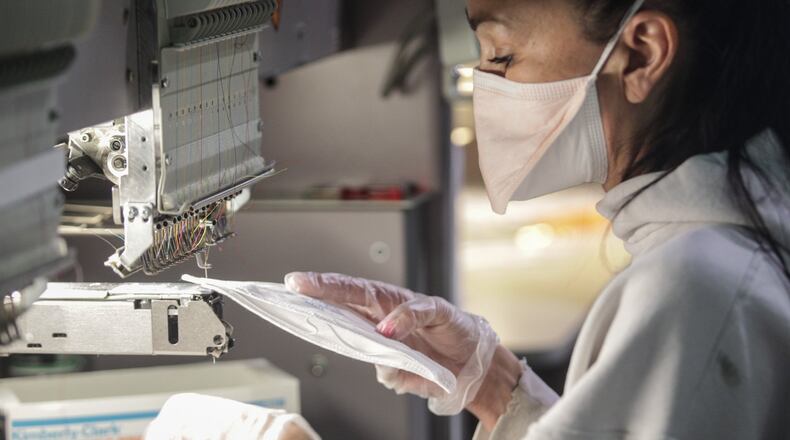The Dayton Daily News is chronicling the ways local businesses are innovating their processes and products.
Miamisburg’s epluno is an example. The company’s name comes from the Latin phrase “e pluibus unum,” for “out of many, one.”
The company was born as a software and e-commerce company serving first smaller to medium-sized retailers, then schools, said Paul Scapatici, founder of epluno.
Epluno often worked with school uniforms in that role, putting it in good stead for its new mission — making and refurbishing N95 respirator masks. The firm has a center in Miamisburg, a site with digitally controlled embroidering machines, presses and other equipment, machines useful for working on school uniforms and fabrics.
RELATED: This local bank is deluged with Paycheck Protection applications
With that equipment, epluno is working on 30,000 face masks for a Dayton-area hospital, a customer of one of epluno’s customers. (In an interview Monday, Scapatici said he could name neither the customer nor the hospital.)
Governments and businesses across the country are discovering what Scapatici has discovered: Millions of these masks are in storage, but often are outdated or too old to use.
Franklin Fire Chief Jonathan Westendorf said the Warren County Emergency Operations Center (EOC) became aware of epluno in the center’s effort to locate N95 masks.
RELATED: Base requires shoppers to wear masks
An allotment of masks from the EOC to the fire department were found to be too old, with the masks’ elastic straps dry-rotted. “When you expanded it out, it would break,” Westendorf said.
Epluno was able to make those faulty masks usable, with new elastic bands. Now, the fire department has a total of 360 N95 masks ready for use.
Westendorf called epluno’s work “fantastic.”
“That meant the world to us,” the chief said. “We weren’t able to procure masks in any other way in a short period of time.”
“We like to think of ourselves as a pretty creative company,” Scapatici said.
When the company’s hospital customer saw what epluno could do, the reaction was clear.
“The hospital saw it,” Scapatici said. “They came in and audited our equipment and said, ‘This is amazing. I can’t believe you did it.’ Off to the races we went.”
The company is now delivering masks daily. Refurbishing the masks is much cheaper than buying new masks which are especially expensive these days.
He thinks sales will soon reach a healthy level — so much so that Scapatici intends to add to his workforce of 26 employees.
“I am absolutely going to be hiring,” he said. “I am going to be buying more equipment. I want to be a help with the medical, but I also want to be a help to the economy. I want to be able to hire people.”
The company can be reached at (800) 249-5275 or info@epluno.com.
Tracking sanitazation
In Dayton, Pelican Technologies has released its “Sparrow Clean-Point” QR-code product.
Sparrow Clean-Point uses unique QR code markers placed at various locations within a building in combination with Pelican’s Sparrow app.
Each time an object that corresponds to one of those unique QR markers is cleaned or sanitized, the person who cleaned the area scans the Sparrow Clean-Point marker with a smartphone and their activity is recorded, Pelican said.
“This lets all our corporate tenants and visitors know how clean our building is,” said Larry Walling, leasing manager of the Claypool building on Linden Avenue. “It took 10 minutes to set up and two minutes to show cleaning staff how to us it. The report is updated every minute and colored areas show if someplace may have been missed.”
Companies stepping up
April Pollock and Shelly Heller formed Tempagenix LLC in 2016, channeling for the retail market the production of Dayton-made disposable paper thermometers that can be worn on one’s forehead. The thermometers are made made by CAVU Group in Moraine.
“We have grown to a $3 million business in about 17 days,” Heller told the Dayton Daily News earlier this month. “And there are only two of us.”
Also in Dayton, Battle Sights Technologies is shifting from military and first-responder-focused battlefield and emergency technologies to make a more humble but much-needed product — hand sanitizer.
“We have a bunch of companies that are trying to take advantage and be of service,” said Scott Koorndyk, president of Dayton’s Entrepreneurs Center, a downtown Dayton incubator for technology-focused business start-ups, like Battle Sight and Tempagenix.
Last week, software developed by a University of Dayton Research Institute (UDRI) scientist to diagnose COVID-19 was exclusively licensed by a South Carolina software development company Blue Eye Soft, a company led by a UD graduate.
The technology, which detects the presence of COVID-19 in chest X-rays in seconds with 98 percent accuracy, was adapted from existing medical diagnostic software in a matter of hours, UDRI said.
Beyond Dayton, businesses in Ohio are making a mark, too.
Battelle, a Columbus-based non-profit, has developed a “Critical Care Decontamination System” that can sterilize and prepare for reuse tens of thousands of respirator face masks every day.
That technology was important enough to be the subject of a phone call from Ohio Gov. Mike DeWine to President Donald Trump on a Sunday afternoon earlier this month. DeWine urged the president to push the Food and Drug Administration (FDA) to permit an expanded emergency use of the technology, which the FDA granted that very evening.
And Abbot Labs, which bottles nutritional drinks in a Tipp City facility, says it has started distributing a rapid point-of-care test for COVID-19.
Abbott has shipped more than 190,000 rapid tests to customers in 21 states. Abbot in recent weeks said it is producing 50,000 tests every day.
Unmatched ingenuity
The coronavirus pandemic is no match for the Dayton region’s innovative spirit. Count on us to continue our in-depth coverage on the ingenuity that runs deep in our community. Do you know of a business? Contact us at tom.gnau@coxinc.com
About the Author

